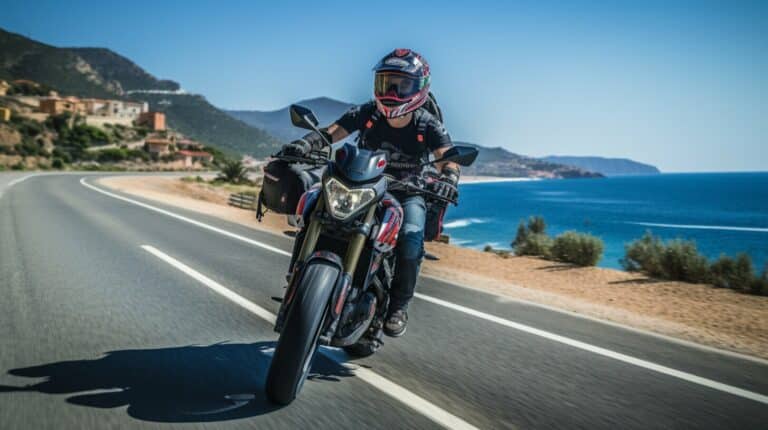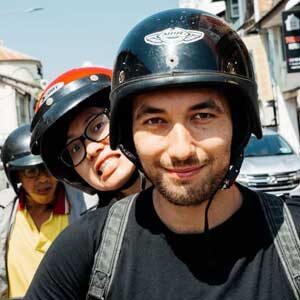Motorcycle helmets are mandatory for both drivers and passengers in Spain. It is a legal requirement for those riding motorcycles, mopeds, quads, and three-wheeled vehicles to wear properly approved helmets. Failure to comply with this regulation is considered a serious infraction and can result in the loss of three points from a driving license. It is the responsibility of the driver to ensure that all passengers are wearing helmets.
When it comes to helmet selection, it is recommended to use full-faced helmets for maximum protection in case of an accident. These helmets provide comprehensive coverage, protecting the head, face, and jaw. They have been proven to significantly reduce the risk of head injuries during motorcycle accidents.
In addition to helmets, it is also important to wear suitable clothing while riding in Spain. This includes gloves and jackets, which provide added protection against injuries in the event of a fall or collision.
Cyclists in Spain are also required to wear approved helmets. Whether riding a motorcycle or a bicycle, wearing a helmet is crucial for personal safety on the road.
Reflective vests should be used when getting out of a vehicle and walking on the road in Spain. These vests enhance visibility, helping other drivers to notice pedestrians and reducing the risk of accidents.
Lastly, it is essential to carry the necessary documentation while riding a motorcycle in Spain. This includes a valid driving license, insurance policy, and ITV/MOT certificate. Having these documents readily available can help avoid legal complications in case of an accident or an encounter with law enforcement.
Key Takeaways:
- Motorcycle helmets are mandatory for both drivers and passengers in Spain.
- Full-faced helmets are recommended for maximum protection.
- Wearing suitable clothing, such as gloves and jackets, is crucial for additional safety.
- Approved helmets are also required for cyclists in Spain.
- Reflective vests should be used to enhance visibility when walking on the road.
- Carrying the necessary documentation, including a valid driving license and insurance policy, is important while riding in Spain.
Spanish Motorcycle Helmet Regulations
In Spain, motorcycle helmet regulations apply to drivers and passengers of motorcycles, mopeds, quads, and three-wheeled vehicles. It is a legal requirement to wear properly approved helmets while operating or riding these vehicles on Spanish roads. Not wearing a helmet is considered a serious infraction and can result in the loss of three points from a driving license.
It is the responsibility of the driver to ensure that all passengers wear helmets as well. To ensure maximum protection in case of an accident, it is recommended to use full-faced helmets, which provide superior coverage for the entire head and face.
In addition to helmets, it is important to wear suitable clothing while riding a motorcycle in Spain. This includes gloves and jackets, which provide added protection against injuries in the event of a fall or collision.
| Key Points: | |
|---|---|
| Motorcycle Helmet Regulations | Apply to drivers and passengers of motorcycles, mopeds, quads, and three-wheeled vehicles |
| Legal Requirement | Properly approved helmets must be worn |
| Consequences | Not wearing a helmet can result in the loss of three points from a driving license |
| Recommended Helmet | Full-faced helmets provide maximum protection |
| Additional Safety Gear | Wear suitable clothing, including gloves and jackets |
| Cyclist Requirements | Approved helmets are mandatory for cyclists |
| Reflective Vests | Use reflective vests when getting out of a vehicle and walking on the road |
| Required Documentation | Carry a valid driving license, insurance policy, and ITV/MOT certificate |
Conclusion
Complying with the motorcycle helmet regulations in Spain is crucial for the safety of both drivers and passengers. Wearing a properly approved helmet, along with suitable clothing and other safety gear, can significantly reduce the risk of severe injuries in case of an accident. By following these regulations and carrying the necessary documentation, riders can ensure a responsible and enjoyable riding experience on Spanish roads.
Types of Approved Helmets
To meet Spanish safety regulations, helmets must be properly approved and meet specific standards. The approved helmet types for motorcyclists in Spain include full-faced helmets, open-face helmets, and modular helmets.
Full-faced helmets: These helmets provide the highest level of protection as they cover the entire head, including the face. They have a chin bar that adds extra protection and can be used in both city and highway riding.
Open-face helmets: Also known as 3/4 helmets, these helmets cover the top, sides, and back of the head but leave the face exposed. They are a popular choice for riders who prefer the feel of the wind on their face while still enjoying adequate protection.
Modular helmets:
These helmets provide the flexibility of both full-faced and open-face designs. They have a hinged chin bar that can be flipped up, allowing the rider to have an open-face helmet or easily communicate without removing the entire helmet.
Regardless of the type, all helmets approved for use in Spain must meet specific safety standards, such as the ECE (Economic Commission for Europe) 22.05 standard. This standard ensures that helmets offer adequate impact protection, proper fit, and sufficient visibility for the wearer.
| Type of Helmet | Features |
|---|---|
| Full-faced helmets | Provide full head and face protection, suitable for city and highway riding |
| Open-face helmets | Cover the top, sides, and back of the head, leaving the face exposed for a more open riding experience |
| Modular helmets | Offer the flexibility of both full-faced and open-face designs, allowing the rider to choose based on their preference |
Choosing the right helmet is essential for ensuring personal safety while riding a motorcycle in Spain. It is important to select a helmet that fits properly, provides adequate protection, and complies with the approved standards.
Disclaimer: This article is for informational purposes only and should not be considered legal advice. For the most accurate and up-to-date information, please consult the official regulations and authorities in Spain.
Recommended Helmet Types for Maximum Protection
Full-faced helmets are recommended for maximum protection and safety on Spanish roads. These helmets provide coverage for the entire head, including the chin and face, offering superior impact protection in case of an accident. They are designed to absorb and distribute the force of impact, reducing the risk of head and facial injuries.
When choosing a helmet, it is essential to ensure that it meets the approved safety standards in Spain. Look for helmets that carry the European ECE 22.05 certification, which indicates compliance with the necessary regulations.
It is also important to consider the fit of the helmet. A properly fitting helmet should be snug but comfortable, with no excessive movement when the straps are securely fastened. This ensures optimal protection and prevents the helmet from shifting during a collision.
| Helmet Type | Description |
|---|---|
| Full-Faced Helmet | Covers the entire head, including the chin and face, providing the highest level of protection against impact and debris. |
| Modular Helmet | Combines the coverage of a full-faced helmet with the convenience of a flip-up chin bar, allowing riders to easily switch between open-face and full-face configurations. |
| Open-Face Helmet | Covers the top, sides, and back of the head, but leaves the face exposed. While it offers less protection than full-faced helmets, it provides better visibility and ventilation. |
Remember, wearing an approved helmet is mandatory when riding motorcycles in Spain. By choosing a full-faced helmet and ensuring its proper fit, you can enhance your safety and protect yourself from potential injuries on the road.
Additional Safety Gear – Clothing Recommendations
In addition to helmets, it is essential to wear suitable clothing, including gloves and jackets, for enhanced safety on Spanish roads. Proper protective gear can significantly reduce the risk of injuries in case of an accident. Here are some recommendations for motorcyclists and cyclists:
Gloves
Wearing gloves while riding is crucial to protect your hands from injuries and provide a better grip on the handlebars. Opt for gloves specifically designed for motorcycle use, with reinforced palms and knuckle protectors.
Jackets
A sturdy motorcycle jacket is a must-have to shield your upper body from the elements and potential road rash in case of a fall. Look for jackets made of abrasion-resistant materials, such as leather or textile, with added armor in critical areas like the elbows and shoulders.
Pants
Wearing protective pants can provide additional protection for your lower body. Motorcycle-specific pants are designed to resist abrasion and often come with built-in knee and hip armor. Consider choosing pants that can be securely fastened to your jacket to create a full-body protective system.
Boots
Invest in a good pair of motorcycle boots that offer ankle support and protect your feet and ankles in case of an accident. Look for boots with sturdy soles and additional armor around the heel and toe areas for optimal safety.
Reflective Gear
Enhance your visibility on the road by incorporating reflective elements into your clothing. Reflective vests, armbands, or strips can significantly increase your presence, especially during low light conditions or adverse weather.
Remember, wearing suitable clothing is not just about complying with safety regulations, but also ensuring your overall well-being on the road. By prioritizing your safety and investing in quality gear, you can enjoy your ride with peace of mind, knowing you are well-protected.
| Gear | Description |
|---|---|
| Gloves | Protective gloves with reinforced palms and knuckle protectors |
| Jackets | Abrasion-resistant motorcycle jackets with added armor in critical areas |
| Pants | Protective pants with knee and hip armor for lower body protection |
| Boots | Sturdy motorcycle boots with ankle support and additional heel/toe armor |
| Reflective Gear | Vests, armbands, or strips with reflective elements for increased visibility |
Helmet Requirements for Cyclists
Cyclists in Spain are also required to wear approved helmets while riding. Just like motorcyclists, wearing helmets is a legal obligation for cyclists to ensure their safety on the road. The Spanish bicycle helmet regulations mandate the use of properly approved helmets to protect cyclists in case of accidents or falls.
Approved helmets for cyclists in Spain must comply with specific safety standards and requirements. These helmets are designed to provide maximum protection to the head and minimize the risk of head injuries. It is crucial for cyclists to choose helmets that meet these safety standards to ensure their well-being while riding.
In addition to wearing approved helmets, cyclists should also consider other safety gear to further protect themselves. Suitable clothing, including gloves and jackets, can offer added protection against injuries during accidents. Reflective vests should be used when getting out of a vehicle and walking on the road to enhance visibility and ensure safety.
| Helmet Requirements for Cyclists in Spain | Summary |
|---|---|
| Approved Helmets | Cyclists must wear properly approved helmets that comply with safety standards. |
| Suitable Clothing | Wearing suitable clothing, including gloves and jackets, can provide additional protection against injuries. |
| Reflective Vests | Using reflective vests when walking on the road enhances visibility and ensures safety. |
Reflective Vest Usage
Reflective vests should be used when getting out of a vehicle and walking on the road in Spain. These vests play a crucial role in enhancing visibility and safety, especially during low light conditions or when visibility is limited. By wearing a reflective vest, you can significantly reduce the risk of accidents and ensure that other road users can easily spot you.
According to motorcycle safety regulations in Spain, it is advisable to always carry a reflective vest in your vehicle and put it on before exiting the vehicle. The reflective material on these vests reflects light from other vehicles, making you more visible from a distance. This is particularly important in areas where there are no dedicated pedestrian walkways or sidewalks.
In addition to wearing a reflective vest, it is essential to follow other motorcycle safety regulations in Spain. This includes wearing a properly approved helmet that complies with the specified safety standards. Full-faced helmets are recommended as they provide maximum protection in case of an accident. It is also important to wear suitable clothing, such as gloves and jackets, to protect against injuries.
| Key Points: |
|---|
| Reflective vests enhance visibility and safety |
| Carry a reflective vest and wear it before exiting the vehicle |
| Use a properly approved helmet that meets safety standards |
| Full-faced helmets are recommended for maximum protection |
| Wear suitable clothing, including gloves and jackets |
Remember, motorcycle safety regulations in Spain are in place to protect riders and ensure their well-being on the road. By following these regulations, including using reflective vests and wearing protective gear, you can contribute to a safer riding experience for yourself and others.
Required Documentation for Riders
It is important to carry the necessary documentation, including a valid driving license, insurance policy, and ITV/MOT certificate, while riding a motorcycle in Spain. These documents are essential to ensure compliance with the country’s motorcycle safety regulations and can help avoid potential fines or penalties. Let’s take a closer look at each of these required documents:
| Document | Description |
|---|---|
| Valid Driving License | Every rider must possess a valid driving license that allows them to operate a motorcycle. It is crucial to ensure that the license is up to date and matches the category of vehicle being ridden. |
| Insurance Policy | Riders must have a valid insurance policy that provides coverage for any potential accidents or damages. This policy should meet the minimum requirements set by Spanish law in order to ride legally. |
| ITV/MOT Certificate | An ITV (Inspección Técnica de Vehículos) or MOT (Ministry of Transport) certificate is required to certify that the motorcycle has undergone the necessary safety inspections and is roadworthy. This certificate is mandatory and must be kept up to date. |
By ensuring you have these documents with you whenever you ride, you can demonstrate your compliance with the motorcycle safety regulations in Spain. This not only helps you avoid potential legal issues but also contributes to a safer riding experience for yourself and those around you.
Please note that these requirements may vary depending on the specific region in Spain, so it is always a good idea to check with local authorities or consult the official government websites for the most up-to-date information.
Consequences of Not Wearing Helmets
Not wearing a helmet in Spain is considered a serious infraction that can result in fines and the loss of driving license points. As per the current motorcycle safety regulations in Spain, both drivers and passengers of motorcycles, mopeds, quads, and three-wheeled vehicles are required to wear properly approved helmets for their own protection. It is the responsibility of the driver to ensure that all passengers comply with this requirement.
For individuals caught without a helmet, the fines can range from €200 to €500 depending on the severity of the offense. In addition to the financial consequences, not wearing a helmet can also lead to the loss of three points from the offender’s driving license. This penalty highlights the importance that Spanish authorities place on promoting motorcycle safety and reducing the risk of serious head injuries in road accidents.
By enforcing strict penalties for not wearing helmets, Spanish authorities aim to create a safer environment for both riders and passengers. Wearing a helmet significantly reduces the risk of head injuries and can save lives in the event of an accident. It is crucial for all motorcycle riders and passengers to prioritize their safety by complying with the helmet laws and wearing approved helmets that meet the necessary safety standards.
Table: Motorcycle Helmet Fines and Penalties in Spain
| Offense | Fine | Driving License Points |
|---|---|---|
| Not wearing a helmet | €200 to €500 | Loss of 3 points |
It is worth noting that fines and penalties may vary depending on the specific circumstances and the discretion of the officers enforcing the regulations. To avoid any legal consequences and ensure personal safety, it is strongly advised to always wear a helmet while riding a motorcycle or any other applicable vehicle in Spain.
Importance of Helmet Safety
Wearing a helmet is crucial for personal safety and reduces the risk of severe head injuries in case of an accident. In Spain, it is a legal requirement for drivers and passengers of motorcycles, mopeds, quads, and three-wheeled vehicles to wear properly approved helmets. Not wearing a helmet is considered a serious infraction that can result in the loss of three points from a driving license. The driver is responsible for ensuring that passengers wear helmets.
When it comes to selecting a helmet, it is highly recommended to use full-faced helmets for maximum protection. Full-faced helmets cover the entire head and provide superior safety features, including a chin bar and face shield. They offer excellent impact protection and help to minimize injuries to the face and head. It is important to choose a helmet that meets the approved safety standards and requirements set by the Spanish authorities. This ensures that the helmet offers the necessary protection in case of a crash.
In addition to wearing helmets, using suitable clothing while riding is also essential for personal safety. Gloves, jackets, and other protective gear can provide an extra layer of protection and help prevent injuries in case of accidents. It is necessary to ensure that the clothing fits properly, is made of durable materials, and offers sufficient abrasion resistance. By investing in quality safety gear, riders can significantly reduce the risk of serious injuries.
| Key Points: | |
|---|---|
| Helmet Safety | Reduces the risk of severe head injuries |
| Legal Requirement | Required for drivers and passengers in Spain |
| Full-Faced Helmets | Recommended for maximum protection |
| Suitable Clothing | Includes gloves, jackets, and other protective gear |
While wearing a helmet is important for motorcycle riders, it is equally essential for cyclists. In Spain, cyclists are also required to wear approved helmets to ensure their safety on the roads. Additionally, reflective vests should be used when getting out of a vehicle and walking on the road. These vests enhance visibility and reduce the risk of accidents, especially in low-light conditions.
It is important for riders to carry the necessary documentation while riding a motorcycle in Spain. This includes a valid driving license, insurance policy, and ITV/MOT certificate. These documents may be required for inspection by law enforcement authorities and help ensure compliance with the necessary regulations.
Promoting Motorcycle Safety in Spain
Spain continues to prioritize motorcycle safety and implements measures to promote responsible riding. With the aim of reducing accidents and ensuring the well-being of riders, the country has established stringent motorcycle safety regulations. These regulations emphasize the importance of helmet usage and require all drivers and passengers of motorcycles, mopeds, quads, and three-wheeled vehicles to wear properly approved helmets.
Not wearing a helmet in Spain is considered a serious infraction, resulting in the loss of three points from a driving license. To ensure compliance, it is the responsibility of the driver to ensure that all passengers wear helmets as well. Full-faced helmets are recommended for maximum protection in case of an accident, as they provide comprehensive coverage for the head and face.
In addition to helmets, suitable clothing is essential for a safe riding experience. Riders are encouraged to wear protective gear such as gloves and jackets to minimize the risk of injuries in the event of a fall or collision. Cyclists are also required to wear approved helmets, further emphasizing Spain’s commitment to safeguarding the well-being of all road users.
| Key Motorcycle Safety Regulations in Spain | |
|---|---|
| Helmets | – Mandatory for drivers and passengers of motorcycles, mopeds, quads, and three-wheeled vehicles – Full-faced helmets recommended for maximum protection |
| Protective Clothing | – Suitable clothing, including gloves and jackets, strongly recommended |
| Cyclists | – Approved helmets mandatory for cyclists |
| Reflective Vests | – Recommended when getting out of a vehicle and walking on the road |
| Documentation | – Essential to carry a valid driving license, insurance policy, and ITV/MOT certificate |
Spain’s emphasis on motorcycle safety extends beyond the enforcement of regulations. The country actively promotes awareness and responsible riding through various campaigns and initiatives. These efforts aim to educate riders about the importance of helmet usage, the benefits of protective clothing, and other essential safety practices.
By continuously prioritizing motorcycle safety, Spain endeavors to create a safer environment for riders and reduce the number of accidents on its roads. Through comprehensive regulations, public awareness campaigns, and enforcement measures, the country strives to ensure that motorcycle enthusiasts can enjoy their passion while prioritizing their well-being and that of others.
Conclusion
Ensuring the legal and safe use of helmets is vital for motorcycle riders in Spain to protect themselves and adhere to road safety regulations. In Spain, it is a legal requirement for drivers and passengers of motorcycles, mopeds, quads, and three-wheeled vehicles to wear properly approved helmets. Not wearing a helmet is considered a serious infraction that can result in the loss of three points from a driving license. It is the responsibility of the driver to ensure that all passengers wear helmets.
To maximize protection in the event of an accident, it is recommended to use full-faced helmets. These helmets provide comprehensive coverage for the head, face, and chin, reducing the risk of severe injuries. In addition to helmets, it is important to wear suitable clothing while riding in Spain. Gloves and jackets can provide added protection against injuries.
Cyclists are also required to wear approved helmets in Spain. Whether riding a bicycle or a motorbike, wearing a helmet is essential for personal safety. Reflective vests should be used when getting out of a vehicle and walking on the road, enhancing visibility and reducing the risk of accidents.
When riding a motorcycle in Spain, it is crucial to carry the necessary documentation. This includes a valid driving license, insurance policy, and ITV/MOT certificate. Failing to have these documents can lead to legal consequences and potential fines.
By adhering to the helmet and safety regulations in Spain, riders can significantly reduce the risk of severe injuries or fatalities. It is important to prioritize personal safety and invest in high-quality helmets and protective gear. Responsible riding and compliance with the law contribute to the overall promotion of motorcycle safety in Spain.
FAQ
Q: Are motorcycle helmets required in Spain?
A: Yes, it is a legal requirement for drivers and passengers of motorcycles, mopeds, quads, and three-wheeled vehicles in Spain to wear properly approved helmets.
Q: What happens if I don’t wear a helmet in Spain?
A: Not wearing a helmet is considered a serious infraction that can result in the loss of three points from a driving license.
Q: Who is responsible for ensuring passengers wear helmets in Spain?
A: The driver is responsible for ensuring that passengers wear helmets while riding in Spain.
Q: What types of helmets are recommended for maximum protection in Spain?
A: It is recommended to use full-faced helmets for maximum protection in case of an accident.
Q: What additional safety gear should be worn while riding in Spain?
A: Suitable clothing, including gloves and jackets, should be worn to protect against injuries while riding in Spain.
Q: Are cyclists required to wear helmets in Spain?
A: Yes, cyclists are also required to wear approved helmets in Spain.
Q: When should reflective vests be used in Spain?
A: Reflective vests should be used when getting out of a vehicle and walking on the road in Spain to enhance visibility and safety.
Q: What documentation should I carry while riding a motorcycle in Spain?
A: It is important to carry the necessary documentation, such as a valid driving license, insurance policy, and ITV/MOT certificate, while riding a motorcycle in Spain.







